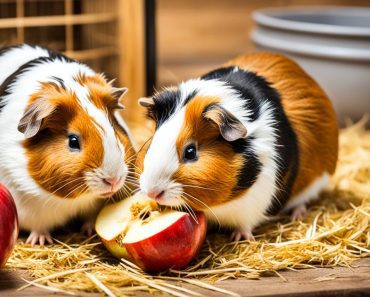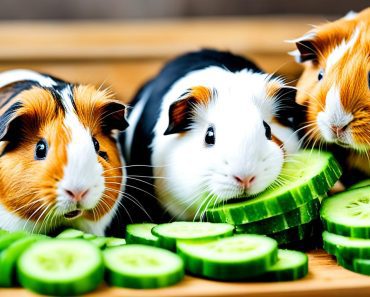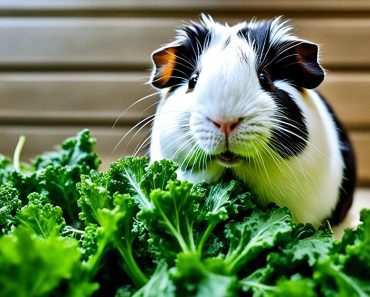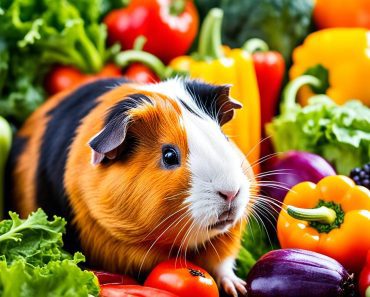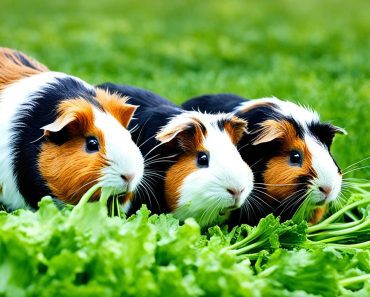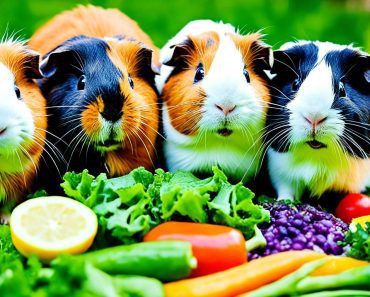As a responsible guinea pig owner, you want to ensure that your furry friend stays happy and healthy. One question that often comes up is whether guinea pigs can eat chocolate. Unfortunately, the answer is no. Chocolate is not safe for guinea pigs to consume, and it’s important to understand why.
Guinea pigs have specific dietary restrictions, and chocolate contains ingredients that can be harmful to them. Chocolate contains caffeine, sugar, oxalates, and theobromine, all of which can have negative effects on a guinea pig’s health.
Even small amounts of chocolate can cause digestive issues, nausea and tremors, high body temperature, fast heart rate, and hyperactivity/restlessness in guinea pigs. These symptoms can be distressing and potentially life-threatening for your pet.
It’s crucial to prioritize your guinea pig’s nutrition and provide them with safe treats and foods that align with their dietary needs. By understanding why chocolate is harmful and making informed choices, you can help keep your guinea pig healthy and thriving.
Can Guinea Pigs Eat Chocolate? No, they shouldn’t. Avoid at all cost!
- Guinea pigs cannot eat chocolate due to its toxic ingredients.
- Chocolate contains caffeine, sugar, oxalates, and theobromine, which can cause digestive issues and other health problems in guinea pigs.
- Even small amounts of chocolate can be dangerous for guinea pigs.
- It’s important to provide a healthy and balanced diet for guinea pigs, focusing on hay, vegetables, pellets, and limited fruit treats.
- If your guinea pig accidentally ingests chocolate, contact your veterinarian for guidance.
Why Can’t Guinea Pigs Eat Chocolate?
Guinea pigs cannot eat chocolate because it contains harmful ingredients that can be toxic to them. Chocolate contains high levels of caffeine, sugar, and oxalates, as well as varying levels of theobromine. These compounds can have detrimental effects on a guinea pig’s delicate digestive system and overall health.
Foods high in oxalates, such as chocolate, can contribute to the development of kidney and bladder stones in guinea pigs. Theobromine, specifically found in chocolate, can cause increased heart rates, tremors, seizures, and even death in extreme cases.
Even small amounts of chocolate can pose risks to guinea pigs, making it essential to avoid feeding them this treat altogether. The potential consequences of introducing chocolate into a guinea pig’s diet far outweigh any enjoyment they may experience.
To illustrate the dangers further, let’s take a closer look at the harmful ingredients in chocolate that make it unsuitable for guinea pigs:
- Caffeine: Chocolate contains significant amounts of caffeine, which can cause hyperactivity and restlessness in guinea pigs. It can also lead to heart palpitations and high blood pressure.
- Sugar: The high sugar content in chocolate can have adverse effects on a guinea pig’s digestive system, potentially causing diarrhea, bloating, and other gastrointestinal issues.
- Oxalates: Oxalates found in chocolate can contribute to the formation of kidney and bladder stones in guinea pigs. These stones can be painful and may require medical intervention.
- Theobromine: Theobromine is a compound found in chocolate that guinea pigs are particularly sensitive to. It can lead to increased heart rates, tremors, seizures, and, in severe cases, even death.
Given these risks, it’s best to keep chocolate away from your guinea pig’s reach and opt for safe, guinea pig-friendly treats instead.
Nutritional Chocolate Facts
When considering the nutritional value of chocolate, it’s important to understand that it can vary depending on the type and brand. However, let’s take a look at the composition and nutritional information of a typical 100g dark chocolate bar with 45-59% cacao solids:
| Nutrient | Amount in 100g |
|---|---|
| Fat | 33.1g |
| Sodium | 24mg |
| Carbohydrates | 61.2g |
| Sugar | 47.9g |
| Calcium | 56mg |
| Potassium | 559mg |
| Phosphorus | 206mg |
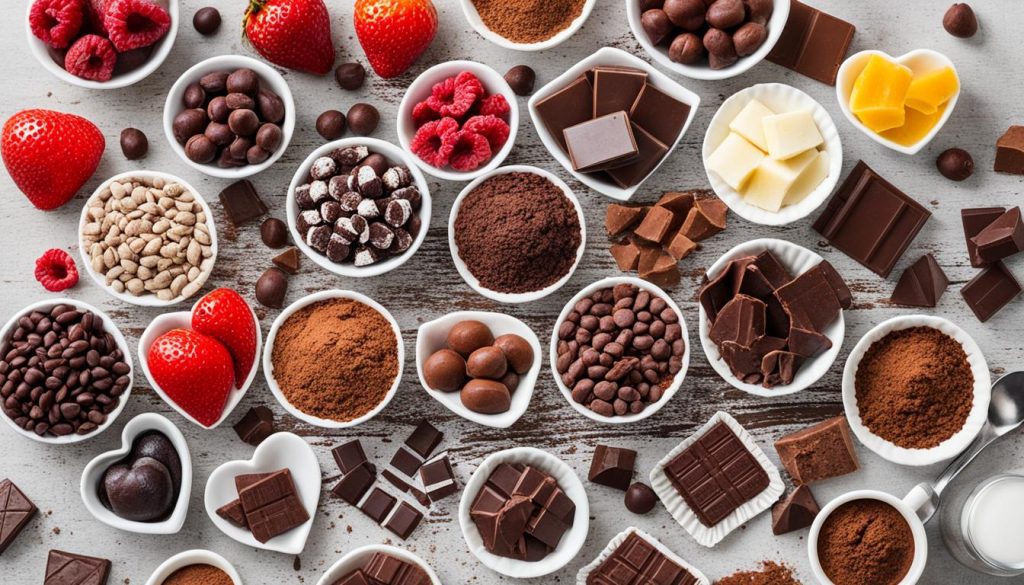
These nutritional values indicate that chocolate is high in fat, sugar, and other ingredients that are harmful to guinea pigs.
As you can see, chocolate is not a suitable food for guinea pigs due to its high fat, sugar, and other components that can be detrimental to their health. It’s essential to prioritize a balanced and nutritious diet for your furry friends instead.
What to Do if Your Guinea Pig Accidentally Ate Chocolate
If your guinea pig accidentally eats chocolate, remain calm and take immediate action to ensure their safety and well-being. Here’s a step-by-step guide on how to respond to guinea pig chocolate ingestion:
1. Remove the Chocolate
As soon as you discover that your guinea pig has ingested chocolate, remove any remaining chocolate to prevent further consumption. This will help minimize the potential harm caused by the toxic ingredients in chocolate.
2. Assess the Chocolate Ingested
Take note of how much chocolate your guinea pig consumed and identify the type of chocolate they ingested. These details will be useful in determining the potential risk and necessary course of action.
3. Contact Your Veterinarian
Contact your veterinarian immediately for professional advice and guidance. They are well-equipped to assess the situation and provide specific recommendations based on your guinea pig’s individual circumstances.
4. Consider the Factors
The appropriate steps to take after chocolate ingestion will depend on factors such as:
- The theobromine content of the chocolate
- The amount of chocolate consumed
- The time elapsed since ingestion
These factors will help determine the level of risk involved and the necessary actions to be taken.
5. Provide Fresh Water and High-Water Content Foods
While waiting for professional advice, offer your guinea pig fresh water to help dilute any chocolate residue in their system. Additionally, providing foods with a high water content, such as lettuce or cucumber, can assist in flushing out the chocolate.
6. Monitor for Symptoms
Keep a close eye on your guinea pig for any signs of digestive upset or other concerning symptoms. It’s important to note that symptoms might not appear immediately and could take several hours to manifest.
| Symptoms | Description |
|---|---|
| Tremors or Shivering | Uncontrollable shaking or trembling movements |
| Nausea and Vomiting | Loss of appetite, vomiting, or other stomach distress |
| Rapid Heart Rate | An unusually fast heartbeat |
| Restlessness or Hyperactivity | Excessive agitation, trouble sitting still, or increased activity levels |
Should any symptoms arise or worsen, seek immediate veterinary attention to ensure proper treatment for your guinea pig.
Remember, the advice provided here serves as a general guideline. It is crucial to consult with a veterinarian for personalized recommendations based on your guinea pig’s specific situation.
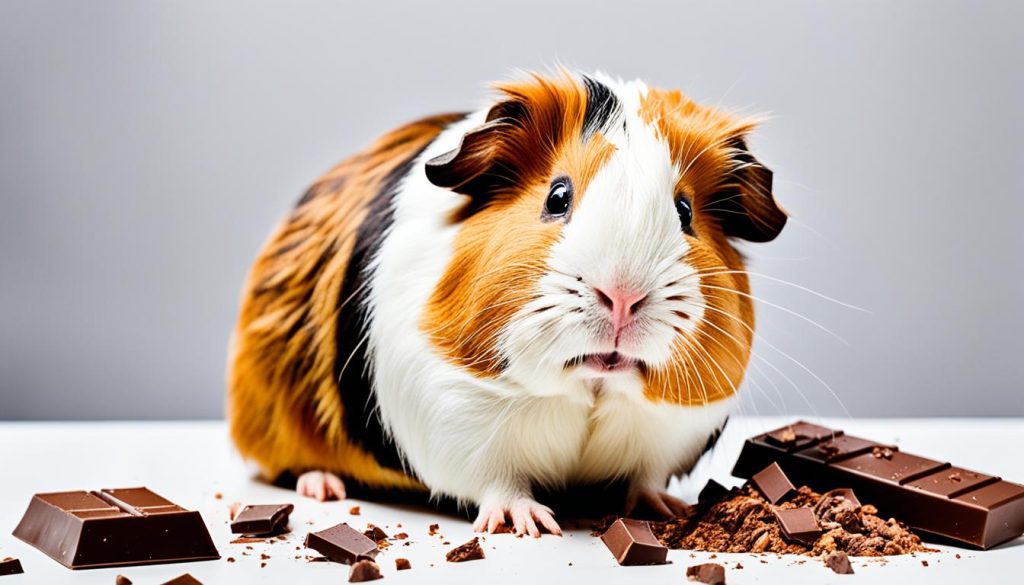
Be proactive in safeguarding your guinea pig’s health. Knowing the appropriate steps to take when chocolate ingestion occurs can help minimize the risks and enable a swift response. Remember, prevention is always better than cure, so ensure that chocolate and other harmful foods are kept out of your guinea pig’s reach.
A Healthy Guinea Pig Diet
A healthy guinea pig diet is essential for their overall well-being and longevity. To meet their dietary requirements, it’s important to provide them with a balanced and nutritious diet.
“A well-balanced diet is the foundation of good health for guinea pigs.”
First and foremost, guinea pigs should have unlimited access to good quality Timothy hay. Hay is crucial for their digestive health and helps wear down their continuously growing teeth. Make sure to provide fresh hay daily.
Alongside hay, guinea pigs should be given approximately one cup of mixed vegetables per day. Choose a variety of vegetables to provide them with a range of nutrients. Some safe and healthy options include:
- Asparagus
- Cilantro
- Carrots
- Berries
- Apples
- Turnip greens
- Leaf lettuce
- Broccoli
- Watermelon
These vegetables are not only safe for guinea pigs but also provide essential vitamins and minerals. Remember to thoroughly wash and chop the vegetables before feeding them to your furry friend.
In addition to hay and vegetables, guinea pigs require a small amount of guinea pig pellets in their daily diet. A tablespoon of pellets specifically formulated for guinea pigs is sufficient to meet their nutritional needs. Look for pellets that are high in fiber and low in sugar to ensure their well-being.
It’s important to note that while fruits can be enjoyed as a treat, they should not make up more than 5% of a guinea pig’s diet. Fruits are high in sugar and can lead to digestive issues and obesity if given in excess.
“A diverse and balanced diet supports a healthy guinea pig.”
Lastly, guinea pigs are unable to produce vitamin C on their own, so it’s crucial to provide them with enough of this essential nutrient. Fresh fruits and vegetables rich in vitamin C, such as bell peppers and strawberries, can help meet their daily requirement. Alternatively, you may consider adding a vitamin C supplement specifically formulated for guinea pigs to their diet.
Remember to always monitor your guinea pig’s weight and overall health. If you notice any changes in their appetite, weight, or behavior, consult a veterinarian for guidance.
By following these guinea pig feeding guidelines and providing a healthy and varied diet, you can ensure that your furry friend receives the necessary nutrients for a happy and active life.
Conclusion
Guinea pigs and chocolate are not a safe pairing. Chocolate contains several ingredients that can be toxic to guinea pigs, including caffeine, sugar, oxalates, and theobromine. Even a small amount of chocolate can have serious health effects on guinea pigs, such as digestive issues, tremors, increased heart rate, and hyperactivity. It is important to keep chocolate away from your furry friends to ensure their well-being.
If your guinea pig accidentally ingests chocolate, it is essential to seek immediate guidance from a veterinarian. They will provide the necessary advice and steps to take based on factors such as the amount of chocolate consumed and theobromine content. Remember to stay calm and remove any remaining chocolate to prevent further ingestion.
To keep your guinea pig healthy and happy, prioritize a balanced diet that includes good quality Timothy hay, a variety of vegetables, and guinea pig pellets. Remember to limit fruit treats to ensure the overall nutritional balance. Additionally, it is crucial to ensure your guinea pig receives enough vitamin C, as they cannot produce it on their own.
By understanding the potential dangers of chocolate and being proactive in providing a suitable diet, you can ensure the well-being of your beloved guinea pig and enjoy a wonderful companionship for years to come.

